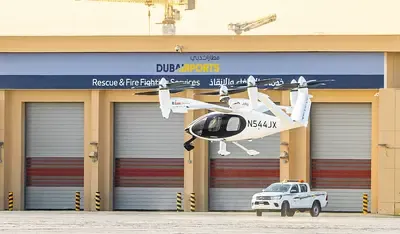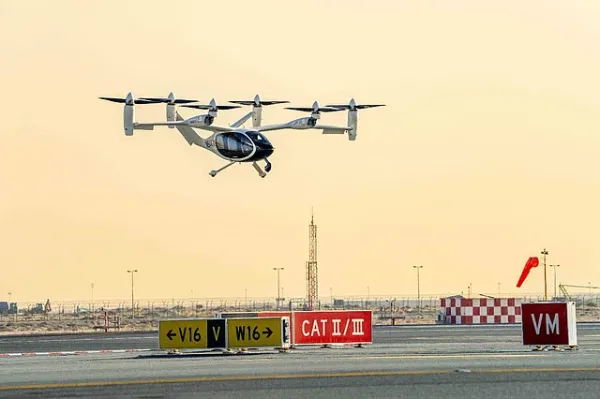
Dubai’s first aerial taxi vertiport located near Dubai International Airport is now 60 per cent complete, the Roads and Transport Authority (RTA) confirmed, as the emirate moves into the infrastructure phase of its planned 2026 launch. Three additional sites will be built at major destinations under agreements signed with Emaar Properties, Atlantis The Royal and Wasl Asset Management Group, forming the backbone of the city’s first electric aerial taxi network.
The airport-side facility, developed by Skyports Infrastructure, has reached its highest structural point and is described as the first of its kind globally. Spanning 3,100 square metres across four floors, it will include two levels dedicated to parking, take-off and landing pads, charging facilities for electric aircraft, and fully air-conditioned passenger areas. It is estimated to support about 42,000 landings annually, serving roughly 170,000 passengers.
Stay up to date with the latest news. Follow KT on WhatsApp Channels.
Under the rollout plan, vertiports are also set to be established at Zabeel Dubai Mall, Atlantis The Royal on Palm Jumeirah, and Dubai Marina. The Dubai Mall site will be located within the Zabeel parking area operated by Emaar Properties, while the Palm Jumeirah vertiport will be situated within Atlantis The Royal. The Dubai Marina facility will be developed at the American University in Dubai parking area, managed by Wasl Asset Management Group. Together, these four vertiports will form Dubai’s initial aerial taxi route network for 2026.
The vertiport construction update follows RTA’s completion of what was described as the first crewed electric vertical take-off and landing (eVTOL) flight between two distinct points within the UAE, conducted with Joby Aviation. The electric aerial taxi took off from the Dubai Jetman Helipad in Margham and flew 17 minutes to Al Maktoum International Airport (Dubai World Central), coinciding with the Dubai Airshow 2025. Joby is the first company globally to complete such a crewed flight in the UAE, according to RTA.
Mattar Al Tayer, Director-General, Chairman of the Board of Executive Directors of RTA, said the progress marks a new milestone in Dubai’s pursuit of advanced smart mobility. He noted that the vertiport partnerships reinforce efforts to expand aerial taxi connectivity across residential, commercial and tourism hubs.
Al Tayer said the service is designed to offer a “fast, safe and convenient” city-wide mobility option, with the journey from Dubai International Airport to Palm Jumeirah expected to take around 10 minutes, compared to about 45 minutes by road. The service will also be integrated with existing transport modes, including public transit and individual mobility solutions such as e-scooters and bicycles.

The aerial taxis, developed by Joby Aviation, operate using electric power and are equipped with six rotors and four battery packs, capable of carrying four passengers and a pilot. The aircraft can reach a top speed of 320kmph and a range of up to 160 kilometres, while operating at lower noise levels than conventional helicopters.
Skyports Infrastructure CEO Duncan Walker said vertiports were essential to the success of advanced aerial mobility systems, calling the development a historic moment as Dubai works towards becoming the first city to implement such services at scale. Joby Aviation founder and CEO JoeBen Bevirt said progress across flight testing and infrastructure was moving the project closer to commercial rollout next year.
The aerial taxi service is being developed through a multi-agency agreement involving RTA, the General Civil Aviation Authority (GCAA), Dubai Civil Aviation Authority (DCAA), Dubai Air Navigation Services (DANS), Skyports Infrastructure and Joby Aviation. Commercial operations are targeted for 2026.
Dubai's first crewed air taxi flight lands at Al Maktoum Airport ahead of 2026 launch Deboard plane, get on flying taxis? DXB passengers to reach hotels, malls in minutes Abu Dhabi Airports to build over 10 vertiports for air taxis, eVTOLs by 2026